- Hugues Gall
- surtitles
- John Stephen Carbonell
- competitions
- Claude Frank
- Eugen d'Albert
- Truro
- Myra Hess: National Treasure
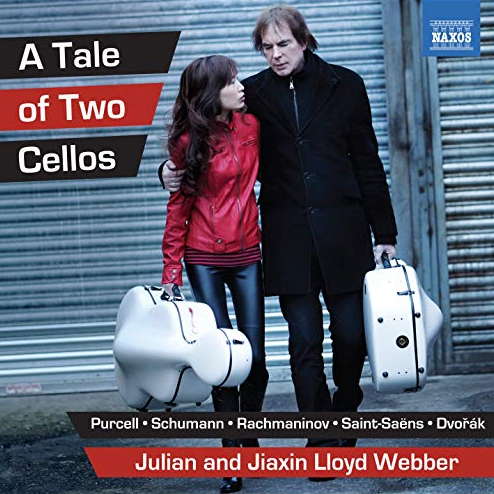 SPONSORED: CD Spotlight. Uncommon Piquancy - Music for two cellos, heard by Howard Smith.
SPONSORED: CD Spotlight. Uncommon Piquancy - Music for two cellos, heard by Howard Smith.
All sponsored features >>
 DISCUSSION: What is a work? John Dante Prevedini leads a discussion about The performing artist as co-creator, including contributions from Halida Dinova, Yekaterina Lebedeva, Béla Hartmann, David Arditti and Stephen Francis Vasta.
DISCUSSION: What is a work? John Dante Prevedini leads a discussion about The performing artist as co-creator, including contributions from Halida Dinova, Yekaterina Lebedeva, Béla Hartmann, David Arditti and Stephen Francis Vasta.
Hundreds of Thousands in Line for a Barber
A new Rome production of Rossini's 'The Barber of Seville' especially for TV, reviewed by GIUSEPPE PENNISI
On 5 December 2020, the audience for Teatro dell'Opera di Roma's season opening night numbered six hundred and eighty thousand. On the billboard, a highly innovative production of Rossini's Barbiere di Siviglia. Of course, in line with COVID-19 restrictions, there was no audience in the theatre but it was in front of the TV cameras of State TV Channel 3 - RAI 3. This Barbiere had nothing in common with the Rossini Opera Festival production of Il barbiere di Siviglia reviewed here on 26 November 2020. That was a production planned for the stage and shown on TV or through streaming. This is a production conceived for TV from the word go. RAI 3 will broadcast it again on the night of 31 December 2020 while waiting to toast the New Year.
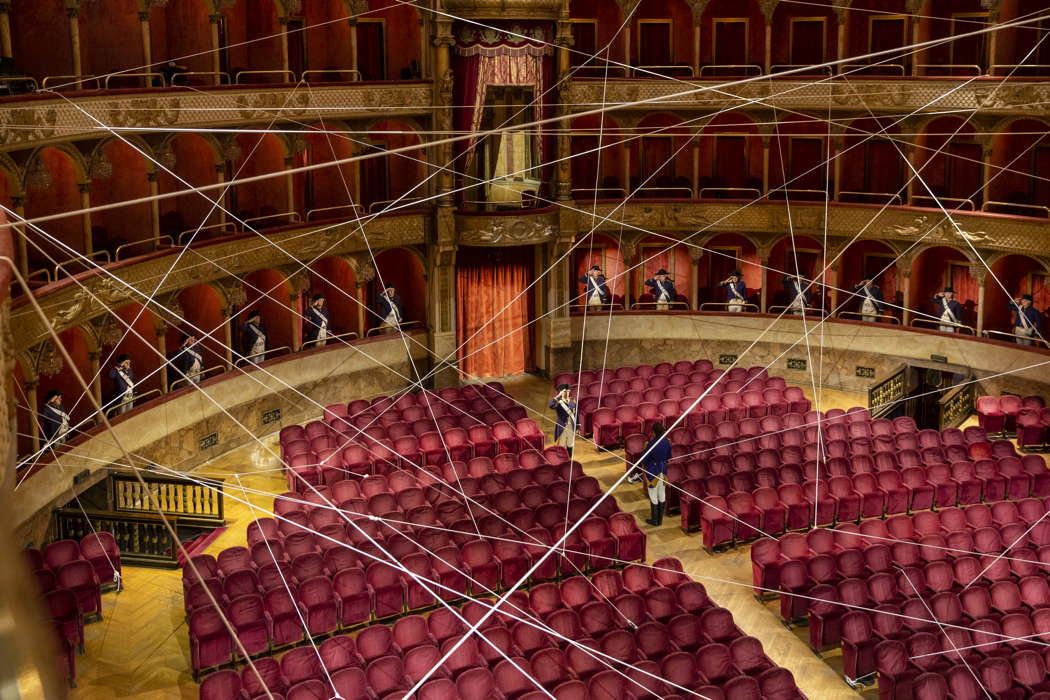
A scene from Rossini's The Barber of Seville in Rome. Photo © 2020 Yasuko Kageyama
It is the brainchild of Mario Martone, a director equally at ease with drama, opera and movies. He worked hand in hand with the music director of Teatro dell'Opera di Roma, conductor Daniele Gatti. The costumes and lighting were the work of two long time staff members of the theatre, Anna Biagiotti and Pasquale Mari. In the broadcast, along with some old timers very well known in their roles - Alessandro Corbelli as Don Bartolo, Alex Esposito as Don Basilio, Patrizia Biccirè as Berta and Roberto Lorenzi as Fiorello - are three newcomers, both as singers and actors in the three principals' parts: Andrzej Filończyk as Figaro, Ruzil Gatin as Almaviva and Vasilisa Berzhanskaya as Rosina.
Andrzej Filończyk, born in 1994, is a young Polish baritone already accomplished in bel canto roles in I puritani and L'elisir d'amore as well as in twentieth century operas - Die Tode Stadt.
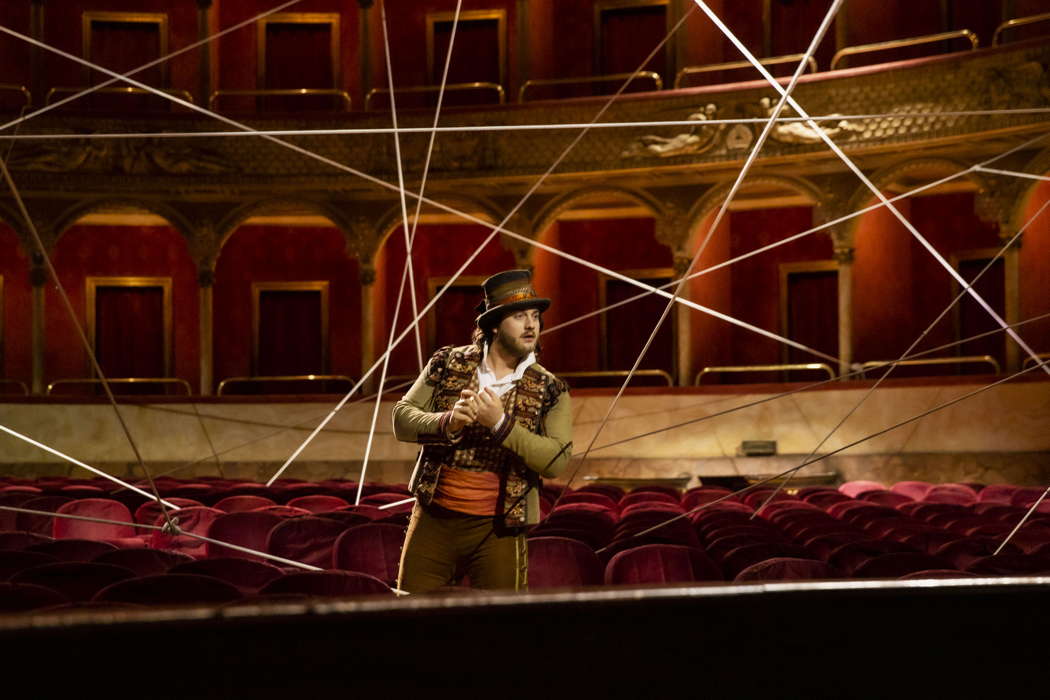
Andrzej Filończyk as Figaro in Rossini's The Barber of Seville in Rome. Photo © 2020 Yasuko Kageyama
Ruzil Gatin, born in 1987, is a Russian tenor who made a name for himself at the Rossini Opera Festival. He handles high Cs well and has an impervious register. Vasilisa Berzhanskaya is a Russian mezzo who was a member of the Salzburg Young Singers Project as well as of the Pesaro Rossini Academy: she can easily descend down to an alto register, as was customary for mezzos in Rossini's time. The three of them have perfect Italian diction and are great actors too.
Let's focus on the production. There are no sets (and very few props) because the action develops within the Teatro dell'Opera itself. The orchestra is in the usual pit. The stage is bare and used only in a few moments. The square in Seville for the first part of Act I is the orchestra seating area. Rosina's balcony is the Royal box. Bartolo's house is in the orchestra area as well as on the stage. The action also reaches the foyer and the corridors of the theatre as well as the entrance hall. During Figaro's entry aria, a video shows the barber and the conductor motorcycling in downtown Rome.
In Pesaro, Il barbiere di Siviglia was seen and shown as a bourgeois comedy of the beginning of the nineteenth century. The Rome production is a truly comic opera with very swift action, a lot of movement, and gags. To keep the action moving fast, a sacrifice was made: at the end of the opera, the impervious aria 'Cessa di più resistere' was cut, even though, in my opinion, Ruzil Gatin would have handled it very well.
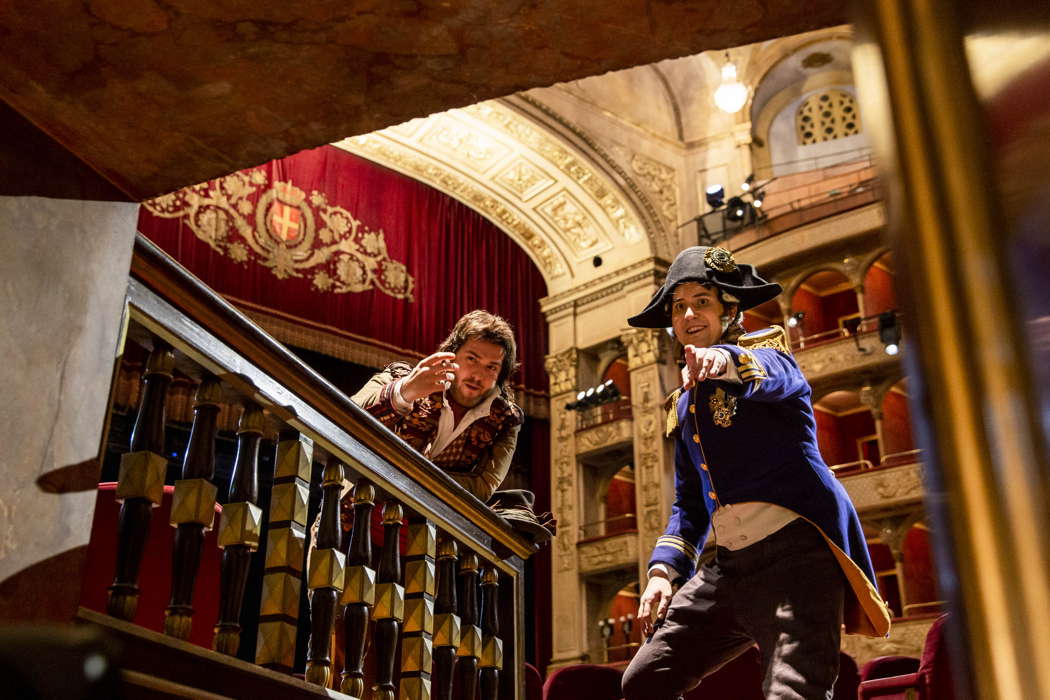
Andrzej Filończyk (left) as Figaro and Ruzil Gatin as Almaviva in Rossini's The Barber of Seville in Rome. Photo © 2020 Yasuko Kageyama
In short, this Barbiere is a blend of opera, movie and TV show. The action flows almost like an Italian comic movie of the golden age of this genre, in the 1960s and 70s. It is meant to enjoy and to make a large TV audience laugh. My wife and I laughed a lot during the nearly three hour screening. I have a clear impression that the singers had a lot of fun too.
The acting is quite demanding, of course, on the singers. Mario Martone made them act as accomplished actors of comic movies, as well as running and jumping in the large area of the Teatro dell'Opera. Rehearsal, I was told, required about a month.
Nonetheless, this is not a comic movie but an opera. It starts without listing the conductor, stage director, cast and all the rest, but by zooming on various sections of the orchestra - of very high level as always - and on Daniele Gatti conducting the overture. Then Fiorello appears on the stage with his entry aria and goes to the orchestra seating area where there are the musicians enlisted by Almaviva to serenade Rosina. From then on, the action moves to all areas of the theatre with a highly skilful camera following it and emphasizing either details with close ups or full scenes with long shots.
There is no lack of attention to the musical aspects. Daniele Gatti conducts the orchestra briskly. A demonstration of versatility, too, because the previous night, conductor and orchestra were engaged in a concert with a program that included the Orchestral Suite No 2 by Johann Sebastian Bach, Le tombeau de Couperin by Maurice Ravel and Pulcinella by Igor Stravinsky.
Ruzil Gatin's very clear timbre was apparent in his entry aria 'Ecco ridente in cielo'. Andrzej Filończyk's agility was shown in his long 'Largo al factotum della città' and confirmed in the parts of the production where he had to sing while running and jumping. Vasilisa Berzhanskaya was sexy and witty from 'Una voce poco fà' to 'Contro un cuor che accende amor'. The two concertato - 'Ehi di casa ... buona gente' at the end of the first Act and 'Di sì felice innesto' at the end of Act II were excellent.
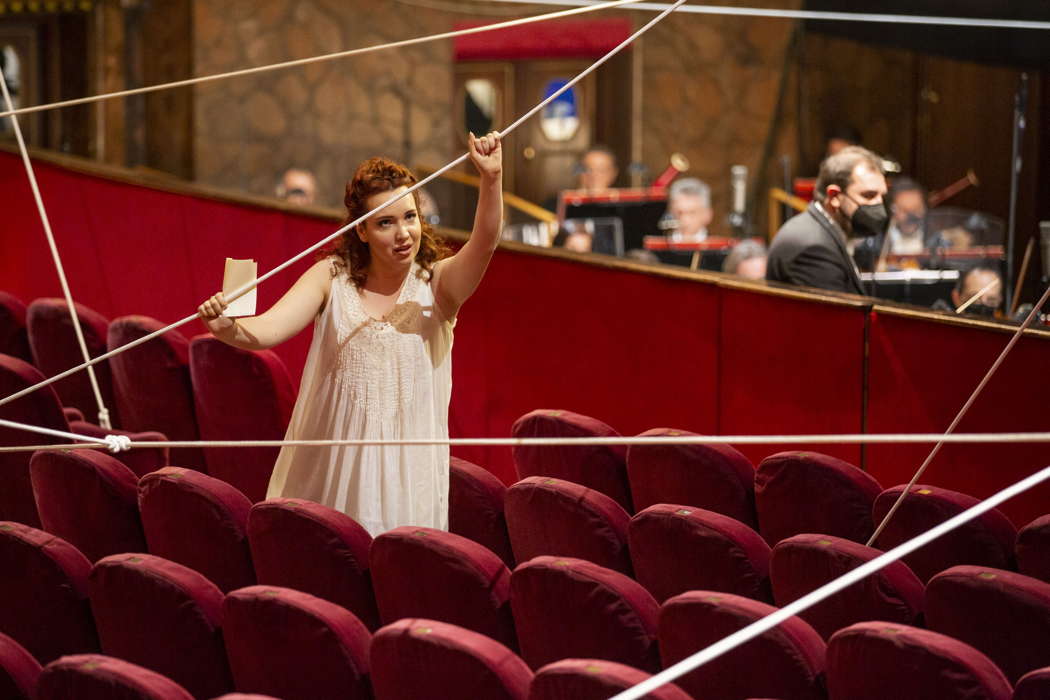
Vasilisa Berzhanskaya as Rosina in Rossini's The Barber of Seville in Rome. Photo © 2020 Yasuko Kageyama
The success spreads by word of mouth. I trust that in Italy and abroad many will switch on RAI 3's New Year's Eve broadcast.
Copyright © 7 December 2020
Giuseppe Pennisi,
Rome, Italy

FURTHER ARTICLES ABOUT 'THE BARBER OF SEVILLE'
FURTHER LIVE CONCERT AND OPERA REVIEWS


